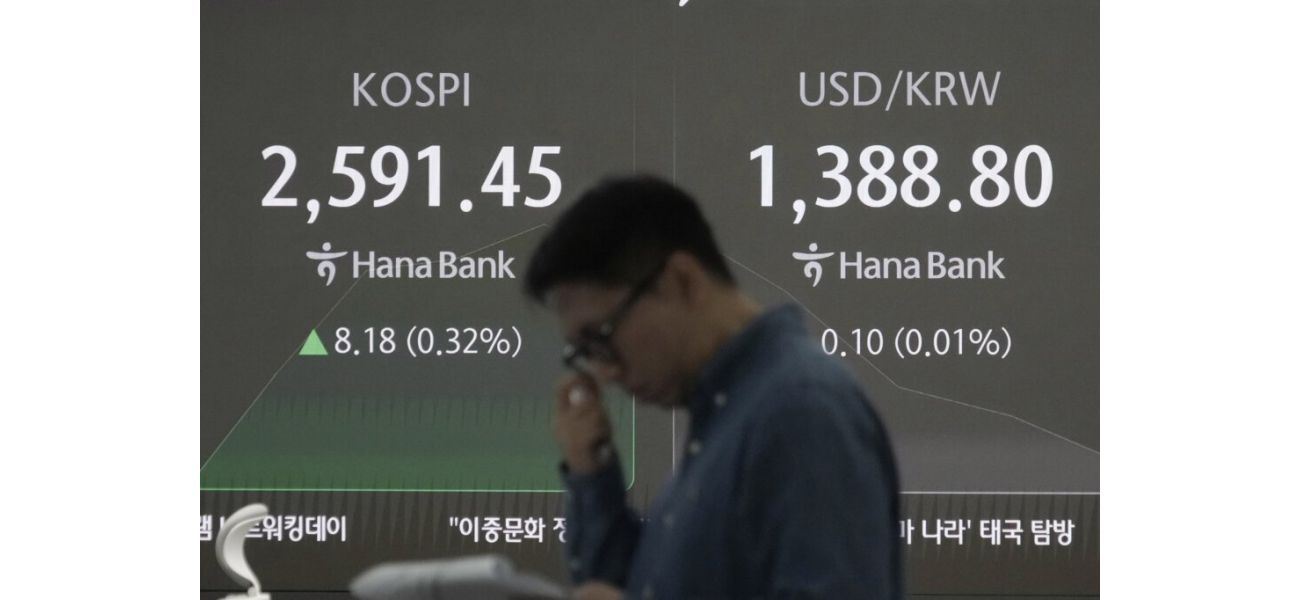Asian stocks up, yen down as ruling party loses majority in Japan, affecting stock market.
Stocks in Asia up as yen falls due to political uncertainty in Japan.
October 28th 2024.

The start of the new week saw a positive trend in Asian shares, as the yen experienced a slight dip. This was amidst political uncertainty following the ruling party's loss of its majority in Japan's lower house during the weekend elections. In currency trading, the U.S. dollar gained strength against the Japanese yen, rising to 153.76 yen from 152.24 yen. This is a significant increase from last month when the dollar was trading at 140-yen levels. The euro, however, saw a slight decrease, trading at $1.0796 compared to $1.0803 previously.
The weakening of the yen is considered a great advantage for Japan's leading exporters, such as Toyota Motor Corp., whose stock rose by 3.7% in Tokyo trading. Other companies, like Nintendo Co. and Sony Corp., also saw an increase in their stock prices, rising by 2.6% and nearly 2.0%, respectively.
Despite the ruling Liberal Democratic Party remaining the top party, several members failed to win reelection in Sunday's vote. This was due to a scandal involving unreported campaign funding. As a result, the ruling coalition with junior partner Komeito secured 215 seats, a significant decrease from the majority of 279 they previously held. While a change of government is not expected, the LDP may need a third coalition partner.
The Tokyo stock market responded positively to this news, with the benchmark Nikkei 225 surging by 1.6% in morning trading to 38,527.52. Other markets in the region also saw gains, with Australia's S&P/ASX 200 rising by nearly 0.1%, South Korea's Kospi edging up by 0.6%, Hong Kong's Hang Seng adding 0.1%, and the Shanghai Composite rising by 0.3%.
Meanwhile, on Wall Street, U.S. stock indexes had a mixed finish last week, with the market experiencing its first losing week since early September. The S&P 500 closed little changed, while the Dow Jones Industrial Average fell by 0.6%, and the Nasdaq composite rose by 0.6%. Investors continue to keep a close eye on company earnings reports, which have been mostly positive so far. More than a third of the companies in the S&P 500 index have reported their latest quarterly financial results, with most of them beating analysts' forecasts. In the coming weeks, companies from around the world are scheduled to report their earnings.
Treasury yields also saw an uptick last week, with the 10-year Treasury yield rising to 4.24% on Friday from 4.21% on Thursday. This increase can be attributed to reports showing a stronger-than-expected U.S. economy. Investors can expect more updates next week on consumer confidence, jobs, and inflation.
The Federal Reserve also made a significant move last week, raising its benchmark interest rate to its highest level in two decades in an effort to control inflation and prevent a recession. This decision was made after the central bank had started cutting interest rates in September. Economists are predicting another cut at the Fed's meeting in November.
In other news, Russia's central bank raised its key interest rate to a record-high 21% on Friday. This was an attempt to combat growing inflation caused by increased military spending following their invasion of Ukraine.
Lastly, in energy trading, benchmark U.S. crude and Brent crude both saw a decrease, falling by $3.19 and $3.25, respectively. This brought the prices to $68.59 a barrel for U.S. crude and $72.80 a barrel for Brent crude.
Contributions to this report were made by AP Business Writers Damian J. Troise and Alex Veiga. For more business news and updates, follow Yuri Kageyama on X at https://x.com/yurikageyama.
The weakening of the yen is considered a great advantage for Japan's leading exporters, such as Toyota Motor Corp., whose stock rose by 3.7% in Tokyo trading. Other companies, like Nintendo Co. and Sony Corp., also saw an increase in their stock prices, rising by 2.6% and nearly 2.0%, respectively.
Despite the ruling Liberal Democratic Party remaining the top party, several members failed to win reelection in Sunday's vote. This was due to a scandal involving unreported campaign funding. As a result, the ruling coalition with junior partner Komeito secured 215 seats, a significant decrease from the majority of 279 they previously held. While a change of government is not expected, the LDP may need a third coalition partner.
The Tokyo stock market responded positively to this news, with the benchmark Nikkei 225 surging by 1.6% in morning trading to 38,527.52. Other markets in the region also saw gains, with Australia's S&P/ASX 200 rising by nearly 0.1%, South Korea's Kospi edging up by 0.6%, Hong Kong's Hang Seng adding 0.1%, and the Shanghai Composite rising by 0.3%.
Meanwhile, on Wall Street, U.S. stock indexes had a mixed finish last week, with the market experiencing its first losing week since early September. The S&P 500 closed little changed, while the Dow Jones Industrial Average fell by 0.6%, and the Nasdaq composite rose by 0.6%. Investors continue to keep a close eye on company earnings reports, which have been mostly positive so far. More than a third of the companies in the S&P 500 index have reported their latest quarterly financial results, with most of them beating analysts' forecasts. In the coming weeks, companies from around the world are scheduled to report their earnings.
Treasury yields also saw an uptick last week, with the 10-year Treasury yield rising to 4.24% on Friday from 4.21% on Thursday. This increase can be attributed to reports showing a stronger-than-expected U.S. economy. Investors can expect more updates next week on consumer confidence, jobs, and inflation.
The Federal Reserve also made a significant move last week, raising its benchmark interest rate to its highest level in two decades in an effort to control inflation and prevent a recession. This decision was made after the central bank had started cutting interest rates in September. Economists are predicting another cut at the Fed's meeting in November.
In other news, Russia's central bank raised its key interest rate to a record-high 21% on Friday. This was an attempt to combat growing inflation caused by increased military spending following their invasion of Ukraine.
Lastly, in energy trading, benchmark U.S. crude and Brent crude both saw a decrease, falling by $3.19 and $3.25, respectively. This brought the prices to $68.59 a barrel for U.S. crude and $72.80 a barrel for Brent crude.
Contributions to this report were made by AP Business Writers Damian J. Troise and Alex Veiga. For more business news and updates, follow Yuri Kageyama on X at https://x.com/yurikageyama.
[This article has been trending online recently and has been generated with AI. Your feed is customized.]
[Generative AI is experimental.]
0
0
Submit Comment





